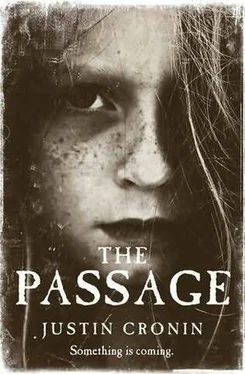Because she knew; she knew it when he kissed her, and then after, and more and more as the days went by. Peter wasn’t hers, could never be hers, because there was another. She’d felt it like a ghost between them, in his kiss. It all made sense now, a hopeless kind of sense. While she’d been waiting for him in the Infirmary, showing him what she was, he had been on the Wall with Alicia Donadio the entire time.
Now, on her way to the Lighthouse with the stew, Sara remembered Gabe Curtis and decided to stop at the Infirmary. Poor Gabe-just forty, and already the cancer. There wasn’t much anyone could do for him. Sara guessed it had started in the stomach, or else the liver. It didn’t really matter. The Infirmary, located across the Sunspot from the Sanctuary, was a small frame structure in the part of the Colony they called Old Town -a block of half a dozen buildings that had once held various stores and shops. The building that served as the Infirmary had once been a grocery store; when the afternoon sun hit the front windows just right, you could still make out the name-Mountaintop Provision Co., Fine Foods and Spirits, Est. 1996-etched into its frosted glass.
A single lantern lit the outer room, where Sandy Chou-everyone called her Other Sandy, since there had once been two Sandy Chous, the first being Ben Chou’s wife, who had died in childbirth-was bent over the nurse’s desk, crushing dillonweed seeds with a mortar and pestle. The air was hot and heavy with moisture; behind the desk, a kettle was chuffing out a plume of steam from on top of the stove. Sara put the stew aside and removed the kettle from the heat, placing it on a trivet. Returning to the desk, she tipped her head toward the dillonweed, which Sandy was shaking out into a strainer.
“Is that for Gabe?”
Sandy nodded. Dillonweed was thought to be an analgesic, though they employed it to treat a variety of ailments-head colds, diarrhea, arthritis. Sara couldn’t say for a fact that it accomplished anything at all, but Gabe claimed it helped with the pain, and it was the only thing he was keeping down.
“How’s he doing?”
Sandy was pouring the water through the strainer into a ceramic mug, the lip chipped and worn. On it were the words NEW DADDY, the letters spelled with the image of safety pins.
“He was asleep a while ago. The jaundice is worse. His boy just left, Mar’s in there with him now.”
“I’ll bring him the tea.”
Sara took the mug and stepped through the curtain. The ward had six cots in it, but only one was occupied. Mar was sitting in a ladder-backed chair beside the cot on which her husband lay, covered by a blanket. A thin, almost birdlike woman, Mar had shouldered the load of Gabe’s care through the months of his illness, a burden plain to see in the crescents of sleeplessness hung beneath her eyes. They had one child, Jacob, sixteen or so, who worked in the dairy with his mother: a large, hulking boy with a face of perpetually vacant sweetness, who could neither read nor write and never would, who was capable of basic tasks as long as someone was there to direct him. A hard, unlucky life, and now this. Past forty, and with Jacob to look after, it was unlikely that Mar would marry again.
As Sara approached, Mar looked up, holding a finger to her lips. Sara nodded and took a chair beside her. Sandy was right: the jaundice was worse. Before he’d gotten sick, Gabe had been a large man-large as his wife was small-with great knotty shoulders and bulky forearms made for work and a prosperously round belly that hung over his belt like a meal sack: a solidly useful man whom Sara had never once seen in the Infirmary until the day he’d come in complaining of back pain and indigestion, apologizing for this fact as if it were a sign of weakness, a failure of character rather than the onset of a serious illness. (When Sara had palped his liver, the tips of her fingers instantly registering the presence that was growing there, she realized he must have been in agony.)
Now, half a year later, the man Gabe Curtis had once been was gone, replaced by a husk that clung to life by will alone. His face, once as full and richly hued as a ripe apple, had withered to a collection of lines and angles, like a hastily drawn sketch. Mar had trimmed his beard and nails; his cracked lips were glazed with glistening ointment from a wide-mouthed pot on the cart beside his bed-a small comfort, small and useless as the tea.
She sat awhile with Mar, the two of them not speaking. It was possible, Sara understood, for life to go on too long, as it was also possible for it to end too soon. Maybe it was his fear of leaving Mar alone that was keeping Gabe alive.
Eventually Sara rose, placing the mug on the cart. “If he wakes up, see if he’ll drink this,” she said.
Tears of exhaustion hung on the corners of Mar’s eyes. “I told him it’s all right, he can go.”
It took Sara a moment. “I’m glad you did,” she said. “Sometimes that’s what a person needs to hear.”
“It’s Jacob, you see. He doesn’t want to leave Jacob. I told him, We’ll be fine. You go now. That’s what I told him.”
“I know you will, Mar.” Her words felt small. “He knows it too.”
“He’s so damn stubborn. You hear that, Gabe? Why do you have to be so goddamn stubborn all the time?” Then she dropped her face to her hands and wept.
Sara waited a respectful time, knowing there was nothing she could do to ease the woman’s pain. Grief was a place, Sara understood, where a person went alone. It was like a room without doors, and what happened in that room, all the anger and the pain you felt, was meant to stay there, nobody’s business but yours.
“I’m sorry, Sara,” Mar said finally, shaking her head. “You shouldn’t have had to hear that.”
“It’s all right. I don’t mind.”
“If he wakes up, I’ll tell him you were here.” Through her tears, she managed a sad smile. “I know Gabe always liked you. You were his favorite nurse.”
It was half-night by the time Sara got to the Lighthouse. She quietly opened the door and stepped inside. Elton was alone, fast asleep at the panel, earphones clamped to his head.
He twitched awake as the door closed behind her on its springs. “Michael?”
“It’s Sara.”
He removed the earphones and turned in his chair, sniffing the air. “What’s that I smell?”
“Jack stew. It’s probably ice-cold by now, though.”
“Well, I’ll be.” He sat up straight in his chair. “Bring it here.”
She placed it before him. He took a dirty spoon from the counter that faced the panel. “Light the lamp if you want.”
“I like the dark. If you don’t mind.”
“It’s all the same to me.”
For a while she watched him eat in the glow of the panel. There was something almost hypnotic about the motions of Elton’s hands, guiding the spoon into the pot and then to his waiting mouth with smooth precision, not a single gesture wasted.
“You’re watching me,” Elton said.
She felt the heat rising to her cheeks. “Sorry.”
He polished off the last of the stew and wiped his mouth on a rag. “Nothing to be sorry about. You’re about the best thing that ever comes in here, as far as I’m concerned. Pretty girl like you, you watch me all you want.”
She laughed-out of embarrassment or disbelief, she didn’t know. “You’ve never seen me, Elton. How can you possibly know what I look like?”
Elton shrugged, his useless eyes rolling upward behind their drooping lids-as if, in the darkness of his mind, her image was there for him to see. “Your voice. How you speak to me, how you speak to Michael. How you look after him like you do. Pretty is as pretty does, I always say.”
She heard herself sigh. “I don’t feel like it.”
Читать дальше












